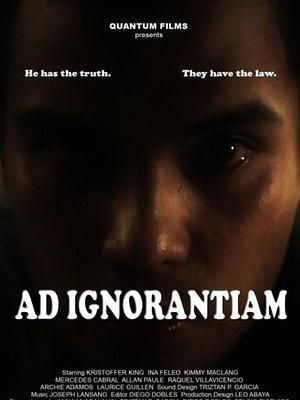简介:Armando Lao's Ad Ignorantiam can be divided into three unequal parts. The first part, tediously shot real time, deta… 展开
Ad ignorantiam

- 导演:ArmandoLao
- 编剧:ZigMadambaDulay
- 制片地区:菲律宾
- 影乐酷ID:5168569dv
- IMDB:tt2590110
- 语言:Filipino |Tagalog
- 国内票房¥:暂无
- 全球票房$:暂无
- 简介:Armando Lao's Ad Ignorantiam can be divided into three unequal parts. The first part, tediously shot real time, details one afternoon in a busy city intersection where a hapless victim (Ina Feleo) of purse snatching, and her friend (Kimmy Maclang) confusedly scour nearby nooks and alleyways for the snatcher. They end up accusing a man (Kristoffer King), who was at the wrong place in the wrong time, of the crime. The second part, which serves to frame the first part within the structure of a court proceeding, displays an methodical and undramatic depiction of what happens inside courtrooms, where the frazzled characters, who are now litigants, of the first part are now joined by lawyers (Racquel Villavicencio and Allan Paule), a judge (Archie Adamos), and the overwrought procedure and decorum required in legal proceedings. The third part has a Supreme Court justice (Laurice Guillen) reciting the decision of the highest court on what seems to be an appeal from the decision of the court as depicted in the second part. The three parts are arbitrarily weaved together, creating a disjointed narrative that attempts to expose the dangerous inadequacies of the Philippines' criminal justice system. Lao experiments with moods and textures. The first part is shot enunciating the grit and agitation of the frenzied and stressed participants of that afternoon's unfortunate incident. The second part is handled with marked sobriety in comparison to the first part's lack of restraint. Its additional parties, the judge and the lawyers, are depicted with emotionless professionalism, remarkably removed from the litigants' heightened vulnerability in the first part. The last part is framed and shot with a hint of sarcasm and irreverence. The litigants have completely disappeared, replaced within a static frame by a mighty magistrate who is reciting her final judgment with an omnipotence that is oblivious to probable truths and personal plights. Lao treads a distance, beginning with the suffocating intimacy of the streets towards the callous and stoic resolve of so-called justice. It emphasizes how much of the humanity, of the compassion, of the truth has been lost to jargon and procedure as the criminal case is passed from one forum to another. Lao's experiment is intellectually stimulating, at best. Like a puzzle that takes extreme patience to solve, Ad Ignorantiam is more a chore than anything else. The rewards it promises are however inadequate. It is emotionally impoverished, lacking the anger or desperation to convert its noble goals from a mere artistic springboard into potent advocacy. It exists merely as an inert showcase of a third world inefficiency and its dramatic consequences. Despite the gravity of the issue it decides to tackle, it struggles to be pertinent because it busies itself with its style and technique, no matter how noxious they are to the senses, than actual substance.










